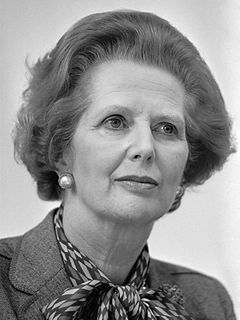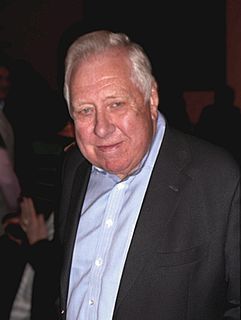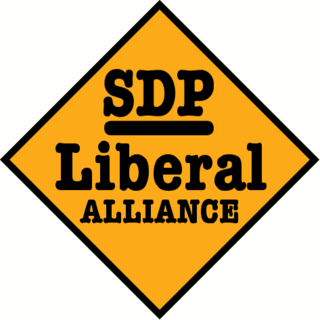
Neil Gordon Kinnock, Baron Kinnock, is a British Labour Party politician. He served as a Member of Parliament from 1970 until 1995, first for Bedwellty and then for Islwyn. He was the Leader of the Labour Party and Leader of the Opposition from 1983 until 1992.

The 1983 United Kingdom general election was held on Thursday, 9 June 1983. It gave the Conservative Party under the leadership of Margaret Thatcher the most decisive election victory since that of the Labour Party in 1945.

Roy Sydney George Hattersley, Baron Hattersley, PC, FRSL, is a British Labour politician, author and journalist from Sheffield. He was MP for Birmingham Sparkbrook for 33 years from 1964 to 1997. He served as Deputy Leader of the Labour Party from 1983 to 1992.

John Smith was a British Labour politician who served as Leader of the Labour Party from July 1992 until his death from a heart attack in May 1994.

The 1987 United Kingdom general election was held on Thursday, 11 June 1987, to elect 650 members to the House of Commons of the United Kingdom. The election was the third consecutive general election victory for the Conservative Party, and second landslide under the leadership of Margaret Thatcher, who became the first Prime Minister since the Earl of Liverpool in 1820 to lead a party into three successive electoral victories.

The SDP–Liberal Alliance was a centrist political and electoral alliance in the United Kingdom. Formed by the Social Democratic Party (SDP) and the Liberal Party, the Alliance was established in 1981, contesting the 1983 general election, 1984 European election and 1987 general election. The Alliance ceased to exist in 1988, when the two component parties merged to form the Social and Liberal Democrats, later renamed the Liberal Democrats.
The Socialist Campaign Group of Labour MPs, often known as the Campaign Group, is a left-wing, democratic socialist grouping of Labour Party Members of Parliament in the House of Commons of the United Kingdom. It was formed in December 1982 as an alternative Parliamentary left-wing group to the Tribune Group. The Campaign Group, as it is commonly known, is often considered on the hard left of the Labour Party and has been highly critical of New Labour.

Brendan Howlin is an Irish Labour Party politician who has served as Leader of the Labour Party since May 2016. He has been a Teachta Dála (TD) for the Wexford constituency since 1987. He served as Minister for Public Expenditure and Reform from 2011 to 2016, Leas-Cheann Comhairle from 2007 to 2011, Deputy Leader of the Labour Party from 1997 to 2002, Minister for the Environment from 1994 to 1997 and Minister for Health from 1993 to 1994. He was a Senator from 1983 to 1987, after being nominated by the Taoiseach.
A leadership election is a political contest held in various countries by which the members of a political party determine who will be the leader of their party.

The 1988 Labour Party leadership election saw Tony Benn, identified with the left wing of the British Labour Party, challenge the incumbent leader Neil Kinnock identified with the more moderate social democratic wing.

A deputy leadership election for the Labour Party in the United Kingdom took place on 2 October 1988 when John Prescott and Eric Heffer challenged Labour's incumbent Deputy Leader Roy Hattersley. Hattersley had served in the position since 1983.

The Leader of the Labour Party is the most senior political figure within the Labour Party in the United Kingdom. Since 12 September 2015, the office has been held by Jeremy Corbyn, who has represented the constituency of Islington North since 1983.
The Labour Party is a centre-left political party in the United Kingdom that has been described as an alliance of social democrats, democratic socialists and trade unionists. The party's platform emphasises greater state intervention, social justice and strengthening workers' rights.
Labour or Labor Party leadership election may refer to:

A deputy leadership election for the Labour Party in the United Kingdom took place on 2 October 1983 to replace incumbent Deputy Leader Denis Healey. Healey had served in the position since 1980, becoming deputy leader at the same time that Michael Foot became party leader. Foot and Healey had both announced their resignations after the general election on 9 June 1983, in which a disastrous performance left the Labour Party with just 209 seats in parliament.

The 2015 Labour Party leadership election was won by Jeremy Corbyn with a landslide victory. The election was triggered by the resignation of Ed Miliband as Leader of the Labour Party on 8 May 2015, following the party's defeat at the 2015 general election. Harriet Harman, the Deputy Leader, became Acting Leader but announced that she would stand down after the leadership election.
On 12 December 1980, a New Zealand Labour Party leadership election was held to determine the leadership of the New Zealand Labour Party. The leadership was retained by former Prime Minister Bill Rowling, who had led the party for the last six years.

The 2016 Labour Party leadership election was called when a challenge to Jeremy Corbyn as Leader of the Labour Party arose following criticism of his approach to the Remain campaign in the referendum on membership of the European Union and questions about his leadership of the party.

The 1989 New Zealand Labour Party leadership election was held to determine the leadership of the New Zealand Labour Party. The leadership was won by Christchurch Central MP Geoffrey Palmer, who had been Deputy Leader the party since 1983.









